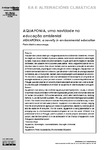AQUAPONIA, uma novidade na educação ambiental

View/
Use this link to cite
http://hdl.handle.net/2183/22384
Except where otherwise noted, this item's license is described as Atribución-CompartirIgual 3.0 España
Collections
Metadata
Show full item recordTitle
AQUAPONIA, uma novidade na educação ambientalAlternative Title(s)
AQUAPONIA, a novelty in environmental educationAuthor(s)
Date
2017Citation
Ambientalmente Sustentable, 2017, 23-24: 101-106. ISSN: 1887-2417
Abstract
[Resumo] A aquaponia é uma atividade que conjuga a aquacultura e a hidroponia. Geralmente, consiste na criação em circuito fechado de peixes e plantas, sendo ambos destinados à alimentação humana. Os peixes excretam compostos azotados, os quais, após transformação por bactérias nitrificantes, são utilizados como nutrientes pelas plantas. Assim, a água fica limpa de novo e disponível para os peixes. Este circuito fechado permite aumentar a produção de alimentos de forma sustentada, poupar água e evitar poluição dos solos e das águas. A aquaponia é um conceito transversal a diversos contextos, que vão desde o nível local, de uma agricultura de subsistência, até um nível global, marcado pela sobrepopulação e pela depleção de recursos. Por este motivo, a aquaponia tem vindo a ser abordada de forma emergente por programas de educação ambiental um pouco por todo o mundo. A EPAMAC é uma escola profissional em Portugal, que está presente em diversos projetos associados ao tema e tem vindo a revelar-se uma instituição embaixadora do conceito de aquaponia no sistema educativo português [Abstract] Aquaponics is an activity that combines aquaculture and hydroponics. Usually, it consists on a closed-circuit combination of fsh farming and plant growth, both of which are destined for human consumption. Fish excrete ammonia, which, after transformation by nitrifying bacteria, is used as nutrients by plants. This way, water becomes clean again and available for fish. This closed circuit allows to increase food production in a sustainable way, to save water and to avoid soil and water pollution. Aquaponics is a transversal concept, ranging from the local subsistence agriculture context to a global level, marked by overpopulation and the depletion of resources. For this reason, aquaponics is being approached in an emerging way by environmental education programs all over the world. EPAMAC is a professional school in Portugal, which is present in several projects associated with the subject, and has been proven to be an ambassador of the concept of aquaponics in the Portuguese educational system
Keywords
Aquaponia
Alimentação
Sustentabilidade
Educação ambiental
Aquaponics
Food
Sustainability
Environmental education
Alimentação
Sustentabilidade
Educação ambiental
Aquaponics
Food
Sustainability
Environmental education
Rights
Atribución-CompartirIgual 3.0 España
ISSN
1887-2417






